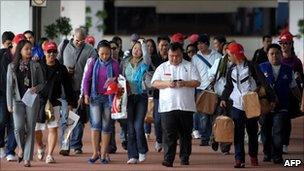Air travel growth slows amid political unrest
- Published

Passenger demand for air travel is still growing - but is being held back by political upheaval
The political turmoil in the Middle East slowed growth in air passenger numbers in February, according to the international air transport association, IATA.
Travellers hoping to visit the region delayed or postponed their journeys, depressing monthly numbers.
The unrest in the Middle East and North Africa reduced growth to 6% in February.
That was down from a revised 8.4% rise in January.
IATA said: "The political unrest in the Middle East and North Africa during February is estimated to have cut international traffic by about 1%. As such it is responsible almost entirely for the slippage in passenger demand growth."
Air cargo growth fell to 2.3% in February, from 8.7% in January, but the slowdown was attributed to shutdowns in Chinese factories for the Chinese New Year, which took place in the period measured.
Rising oil prices also held back demand.
'Step back'
The Japanese earthquake, which occurred on 11 March, and the continuing concerns about the damaged nuclear power plant, are expected to hold back air traffic growth next month too.
IATA chief executive Giovanni Bisignani said: "As the unrest in Egypt and Tunisia spreads across the Middle East and North Africa, demand growth across the region is taking a step back.
"The tragic earthquake and its aftermath in Japan will most certainly see a further dampening of demand from March."
IATA represents 240 airlines operating 94% of all international traffic.
Earlier this month, the organisation warned that airlines would be affected by rising oil prices, which would see their profits almost halve this year.
Mr Bisignani said that what he called the industry's "pathetic 1.4% margin" was under considerable pressure.
- Published2 March 2011